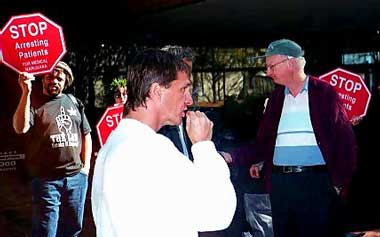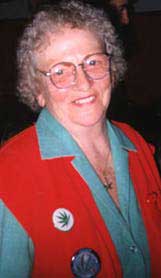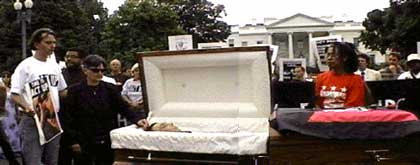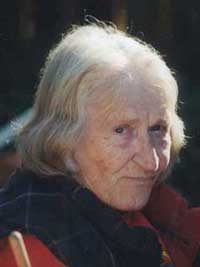
In honor of all the drug policy
reform activists who worked so hard, but did not live to see
the day of freedom and realization. They are true heroes of
liberty and justice.
Page
1: Don Topping, Cheryl Miller, Tom Crosslin and Rollie Rohm,
Peter McWilliams, Genie Brittingham Erstad, Joe Hart, Ian
Hunter, Robert Randall, Gil Puder, Jim
Rosenfield
Page
2: Laura Carden, Robert Lunday, Norm Major, Ralph Seeley,
Ken and Barbara Jenks, Kirk Hampton, Keith David Whitaker,
Roland Heyne Jr., Christie Bohling, Tom
Forcade
Page 3:
Eddie Smith, Brownie Mary Rathbun, Tom Flowers, "Buddy" the
MIA POW, Steve Michael, Steve Smith, Alan Martinez, Rufus
King, Hazel Rogers, Bob Basker
Page
4: Ron Crickenberger, Judith Cushner, Mary Gennoy,
Cecilia Franceschini, Pope Micky, Kioshi Kurimaya
|
Eddie Smith

KY-Ohio AIDS and medical marijuana patient advocate. Died
2002.
Edward Allen Smith (1961 - 2002), who had AIDS for 12
years and cancer for 10, said he would not be able to take
his other medication without marijuana and that it was
therefore essential to his very survival. He championed the
cause of medical access to cannabis. Smith was a
spokesperson of the group, For
a Better Ohio, which had encouraged the state
legislature to pass a law allowing Ohioans with illnesses to
smoke marijuana to alleviate pain. He helped found the
Ohio
Patients Network. As he fought for his life, he fought
for the rights of other Americans needlessly suffering. He
fought injustice, ignorance,and intolerance. The day he
died, Eddie learned that he had been made Freedom Fighter of
the month in HT Dec.2002 issue. He did nor live to see a
copy of the article.
This photo by Gary Storck (IMMLY) shows Eddie at the
October 2000 demonstration at Al Gore's office in Austin TX
organized by Jim Miller, taking a hit off the "torch of
freedom" as NJ Weedman, Julian Heicklen and others look on.
Here's what happened that day:
"Eddie Smith, after describing his essential medical need
for marijuana to control the nausea and vomiting caused by
his AIDS medicine, said he wanted to show Mr. Gaston the use
of medical marijuana and began to consume his medicine. Mr.
Gaston said: "Don't do that here." Eddy replied: "If I can't
do it here, where can I do it?" As he smoked Mr. Gaston
became very upset. He called me to his office to express his
displeasure. Kevin Zeese explained this was a First
Amendment activity targeted at the Vice President for his
inaccurate statements. It was up to Mr. Gaston to decide
whether to arrest an AIDS/cancer patient for his use of a
medicine or to allow him to use marijuana. He said he was
concerned about being part of a marijuana conspiracy or
aiding and abetting a criminal act. I explained that he now
had a sense of what medical marijuana patients have to feel
every day when they fear arrest for using a medicine.
"We went back to the group and Mr. Gaston asked Eddie to
stop his marijuana use. Eddie explained he would not stop
until he was finished. Mr. Gaston said to me, "Can't you do
anything about this?" I said, it is not my decision; it is
up to Eddie. Security arrived and Mr. Gaston looked unsure
what to do and then decided to send security away. Eddie
finished his medical use and as we left we explained to Mr.
Gaston that the Gore campaign should be warned that other
actions like this are likely because seriously ill people
were very upset with his comments. Further, it was very
likely that Mr. Gore will lose a lot of votes to Ralph Nader
unless he corrects this misstatement." -- Kevin Zeese
|
 Brownie
Mary Brownie
Mary
California medical marijuana advocate. Died
1999.
Mary Rathbun worked at an AIDS hospice in the San
Francisco area, watching the slow, painful disentegration of
people infected with HIV and trying to bring them what
comfort she could. One of the worst aspects was seeing how
much they suffered in the course of taking their
chemotherapy "drug cocktails," a combination of toxic
medications. While the process clearly helped many patients
and helped extend their lives, the relentless nausea and
vomitting made her wonder if the cure might not be worse
than the disease.
She noticed that some patients seemed to be handling
their medications much better than others and eventually
discovered the dirty little secret of the pharmaceutical
world: Medical marijuana improved the quality of life and
allowed patients to take their other meds with a minimum of
suffering. Not only that, she noticed a big difference in
the mental outlook of patients who used marijuana. "They
went from dying of AIDS to living with AIDS in just a few
puffs," she would later recall. Determined to ease their
suffering, Mary began a clandestine operation of bringing
cannabis to patients who could smoke it and baking brownies
containing the herb for those who could not. Not only did it
reduce their nausea and lift their spirits, she noticed that
their appetites and interest in food grew and many of them
enjoyed eating for the first time in months, and some
actually put on weight -- essential to survive the "wasting
syndrome."
With missionary zeal, Mary began to deliver her brownies
to patients outside the hospice and it was in the process of
doing this that she was arrested and charged with drug
trafficking. Dubbed "Brownie Mary" by the news media, the
sympathetic older woman became such a folk hero that the
charges against her were dropped. But she wouldn't stop
there. Brownie Mary became a spokesperson for the medical
marijuana movement and helped rally San Francisco to pass
local legislation protecting access to medical marijuana and
later Proposition 215, the California medical marijuana
initiative. For more on her story, visit Human
Rights and the Drug War or read the article
at Cannabis Culture.
|
Tom Flowers
California, medical marijuana patient advocate. Died
2000.
Although he was wracked with crippling arthritis, Tom
Flowers kept busy in his garden. Tucked amid the orchids and
kitchen herbs, Tom was growing his own medicine. A quiet
person in the Oakland area reform movement, but with a
biting wit, Tom was repeatedly hospitalized for his
crumbling health. Nonetheless, he managed to write several
important books on the cultivation of marijuana and how to
cook with it. This was his enduring legacy to patients:
Teaching others how to produce and use cannabis for an
improved quality of life.
|
 Buddy
the Drug War POW Buddy
the Drug War POW
Missing in Action: January 2003
Buddy
is a life-size stuffed dummy, last seen January 29, 2003
at the University of Central Florida, Orlando, FL, Main
campus, Visual Arts Building, Room 132. Buddy was attending
the UCF NORML "Casualties of the Drug War" panel discussion
when he was stolen. Besides being an integral part of our
ongoing struggle against America's unjust and futile War on
Drugs, Buddy is also a cherished member of the November
Coalition family. Buddy was designed and built by Martha
Christman, a long-time member of the November Coalition
whose brother, Mark, died in federal prison while serving a
mandatory 10 year sentence for marijuana conspiracy.
Buddy has been with us for years, and we miss him
terribly! He was a beloved part of the November Coalition's
jail cell exhibit seen at rallies and events all across the
country. If you have any information on Buddy's whereabouts,
please contact Tom Murlowski at (509) 684-1550 or tom@november.org.
No questions will be asked; we just want him back.
Help bring Buddy Home! For a PDF (Adobe Acrobat) copy of
our "ABDUCTED!" poster, contact tom@november.org; we'd love
to see these things plastered all over central Florida,
especially on and around the University of Central Florida
main campus, where he was taken. This prints out nicely in
black & white or color. Hopefully whoever kidnapped him
will see one and suffer an attack of conscience, or someone
else will recognize him and force the perpetrator to return
him.
Please forward this information to anyone you think might
want to help.
|

Steve Michael
Washington, DC, Medical Marijuana and AIDS activist.
Died 1998.
Steve Michael, age 42, founder of ACT UP/Washington, DC,
the AIDS Coaliton To Unleash Power, died May 25, 1998 of
AIDS. Michael's partner of seven years, Wayne Turner, gave
the order to disconnect Michael from life support after his
condition severly worsened early Monday morning. Michael had
spent almost four weeks in the intensive care unit at
Washington Hospital Center for treatment of AIDS related
pneumonia. Steve was an integral part of the Initiative 59
medical marijuana campaign in the capitol district. When the
Initiative 59 votes were finally counted, I59 had won by
69%. However, as a federal district, Congress was able to
block the measure from going into effect.
A
political funeral was held June 4 in front of the White
House. Turner made arrangments with federal authorities
to hold Michael's funeral, which would be his last White
House protest. In lieu of flowers, donations should be sent
to ACT UP/Washington, 408 "H" Street, NE, Washington, DC
20002. Turner asks that all DC area activists carry on
Steve's work. Visit ACT UP/Washngton's web site at www.actupdc.org,
or call 202-547-9404 to become involved.
|
Stephen J. Smith
Washington DC, Medical marijuana and ACT/UP
activist. Died 1998.
Stephen J. Smith passed away due to complications from
AIDS early morning, November 16, 1998, at GW University
Hospital in Washington, DC. At the time of his death his
dear friends and fellow activists, William Clemson and
Cheryl Spector, were at his deathbed. His parents were also
present.
Stephen was the founder of ACT
UP/DC, during the Bush administration when Washington
desperately needed a chapter of the activist group. On his
agenda were needle exchange programs, condoms in the high
schools, more federal funding for treatment, and he started
America's first Cannabis Buyer's Club. He also helped launch
the DC chapter of Queer Nation and was involved in numerous
demonstrations and press conferences.
Losing both Stephen J. Smith and Steve Michael within six
months is doing an emotional number on my head, but I feel
that if we don't remember our departed friends and their
activism, who will?
If you wish to make a contribution in memory of Stephen,
and help continue his ideals, please send a check to ACT
UP/Washington, 409 H Street, Washington, DC 20002. This
chapter, especially Wayne Turner, was responsible for
getting the pro-medical marijuana Initiative 59 on the 1998
Washington, DC, ballot. When the Initiative 59 votes were
finally counted, I59 had won by 69%. However, as a federal
district, Congress was able to block the measure from going
into effect. You can also simply light a candle for Stephen,
as I have done. My thoughts are with him and the extended
family he leaves behind. --Michael Petrelis
|
Alan Martinez
California, Medical marijuana activist. Died
1997.
Alan Martinez was a nurse who had his patients and
livelihood affected by Sonoma County officials who decided
to prosecute him for cultivation of medical marijuana
shortly after the state medical marijuana law, Proposition
215, was enacted. He was an epileptic, and probably the
earliest activist to pass away while on trial for having
plants and assisting mmj patients after the change in
law.
You'll see a photograph of him on the ASA
website on the top banner! He passed away in a car
accident during a drive from his home in Santa Rosa to
Bodega Bay. It was felt that he probably suffered a grand
mal seizure and crashed. he had gone without mmj for his own
medical needs and most likely could not keep his malady in
check.
|
Rufus King
March 25,1917 - December 28, 1999
For over 45 years Rufus King was one of America's most
outspoken and energetic critics of drug prohibition.
In 1951 Mr. King became legislative counsel to the
Special Senate Committee to Investigate Organized Crime in
Interstate Commerce (the famous Kefauver Committee which led
to Senator Estes Kefauver (D-TN) becoming the Democratic
nominee to be Vice-President of the United States in 1952 on
the ticket with Adlai Stevenson). The insights gained in
that assignment has led to a career in drug policy reform.
In 1953, his article for the Yale Law Journal, "Narcotics
Bureau and the Harrison Act: Jailing the Healers and the
Sick," was one of the first post-war establishment critiques
of prohibition.
In 1955, he organized the first joint effort by the
American Bar Association and the American Medical
Association, a Joint Committee on Narcotic Drugs. Their
report was a ground-breaking critique of the prohibition
paradigm which was intensely attacked by the Commissioner of
Narcotics, Harry J. Anslinger.
In the decades since then, Mr. King was both an
out-spoken voice and a indefatigable behind-the-scenes
advocate for drug policy and criminal justice reform. From
1957 to 1960 he was the chairman of the Criminal Justice
Section of the American Bar Association. His writing
appeared in the Stanford Law Review, the Journal of the
American Bar Association, Harper's, Newsweek, the
Encyclopedia Britannica and numerous other publications.
Among his books is The Drug Hangup: America's Fifty-Year
Folly, published by W.W. Norton in 1973.
In 1989 he received the first Alfred R. Lindesmith Award
for Scholarship and Writing from the Drug Policy Foundation.
In 1988 he became a member of the Advisory Board of the Drug
Policy Foundation. He has served on the Board of Directors
of NORML (the National Organization for the Reform of
Marijuana Laws), and as an advisor to the National Drug
Strategy Network.
In March 1998, the Alliance of Reform Organizations
presented him with a Award for LIFETIME ACHIEVEMENT IN THE
FIELD OF DRUG POLICY REFORM at a ceremony at the National
Press Club in Washington, D.C. Until his death he was a
regular, volunteer advisor to most drug policy reform
efforts.
Mr. King was a member of the bar in New York, the
District of Columbia and Maryland. He received his Bachelor
of Arts from Princeton in 1938 and his Juris Doctor from
Yale in 1943.
|
Bob Basker
California, marijuana reform activist. Died
2001
Bob Basker was a long time activist
for labor, gay rights and medical marijuana. Because of
his unique skills and connections, plus a gentlemanly
manner, Basker was able to draw together a variety of groups
to work together for the common cause of getting California
voters to pass the 1996 medical marijuana law, Prop 215. He
died April 6, 2001 of heart failure at age 82.
Born in East Harlem in 1918, Basker began his lifelong
commitment to activism and social justice by joining the
student peace movement in the 1930s. He served in the Army
during World War II, where he fought in Europe. In later
years, he was instrumental in increasing the visibility of
gay veterans in the American Legion, as one of the founders
-- along with Paul Hardman -- of San Francisco's Alexander
Hamilton Post 448 of the American Legion, the only American
Legion post with a predominantly GLBT membership.
Active in the civil rights movement in the 1960s, Basker
became founding president in 1965 of Mattachine Midwest, the
Chicago branch of the groundbreaking gay rights group formed
in Los Angeles in 1951 by Harry Hay and a group of four
friends.
When he moved to San Francisco in 1978, Basker continued
his political work as a member of the National Organization
for Women (news - web sites ) and San Francisco's many GLBT
Democratic clubs. He later joined the board of the San
Francisco branch of the NAACP and the California Legislative
Council for Older Americans. After seeing the city ravaged
by the AIDS epidemic of the 1980s, Basker became a
soft-spoken but impassioned medical marijuana advocate in
the 1990s.
 Hazel
Rogers Hazel
Rogers
California, Medical marijuana patient
advocate
Hazel Rogers made national news as the little old lady
smoking from a marijuana pipe at Dennis Peron's Cannabis
Buyers' Club in San Francisco during and after the Prop 215
campaign to legalize medical use.
She also heroically stepped into the void as director of
the Club in 1998 when the state attorney general got a cease
and desist order to stop Peron from operating his 5-story
cannabis dispensary on Market Street. On April 20, 1998, San
Francisco County Sheriff Michael Hennessey served Peron at
around 1:30 p.m. with a court order for him to close his
Cannabis Buyers Club. Hennessey, a supporter of Proposition
215, said he backed medical marijuana clubs because he knew
sick people who appeared to derive therapeutic benefit from
the plant. "I believe it is helpful to have well-run
clubs,'' Hennessey said. On April 21, 1998, Peron announced
that a new club, the Cannabis Healing Center, had been
opened at the site of the old club, to be directed by
78-year-old medical marijuana user and advocate Hazel
Rodgers. Peron, it seems, had decided to run for
governor.
The feisty Rogers followed in Peron's footsteps but the
relentless pressure of the federal and state governments
came to a head when the property owner was threatened with
property forfeiture if he allowed any medical marijuana to
be dispensed from the premises. The club closed its doors
for the last time shortly thereafter.
She rallied support with her call to the patient advocate
community, "You are so strong when you have no fears
anymore".
|

 Brownie
Mary
Brownie
Mary Buddy
the Drug War POW
Buddy
the Drug War POW

